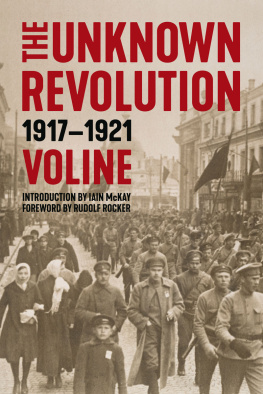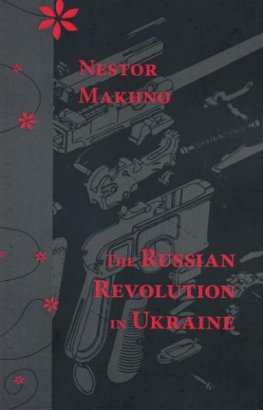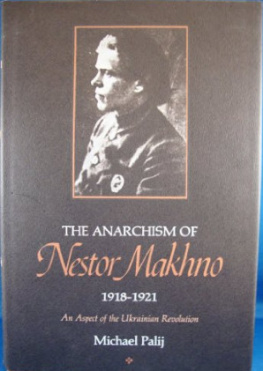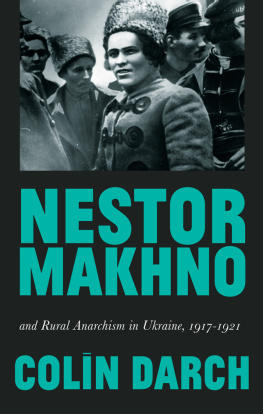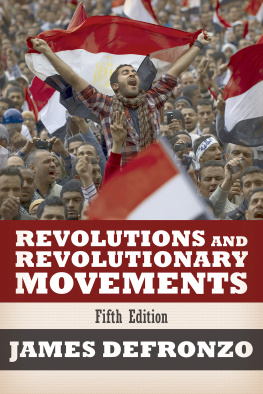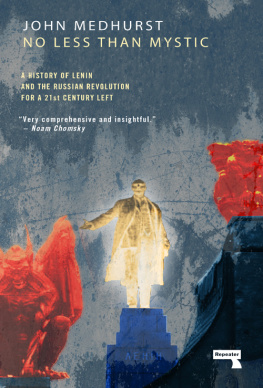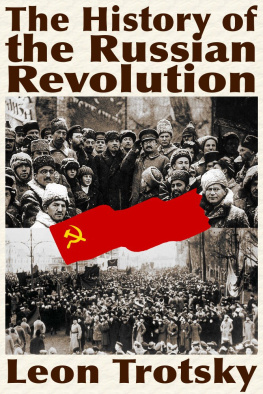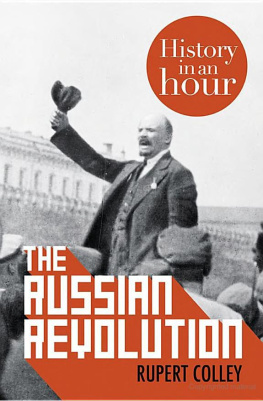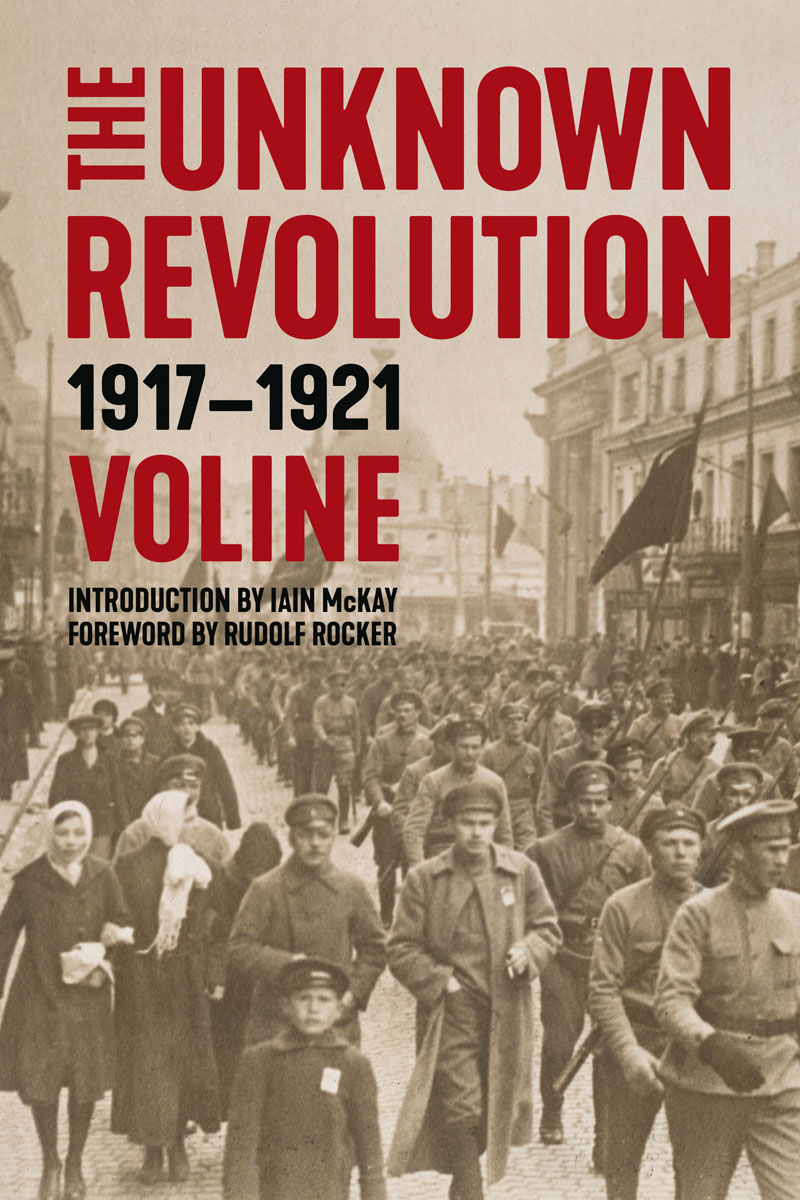
The Unknown Revolution 19171921
Voline
This edition 2019 PM Press
All rights reserved. No part of this book may be transmitted by any means without permission in writing from the publisher.
ISBN: 9781629635774
Library of Congress Control Number: 2018931536
Cover by John Yates / www.stealworks.com
Interior design by briandesign
10 9 8 7 6 5 4 3 2 1
PM Press
PO Box 23912
Oakland, CA 94623
www.pmpress.org
Printed in the USA by the Employee Owners of Thomson-Shore in Dexter, Michigan.
www.thomsonshore.com
CONTENTS
INTRODUCTION TO THE 2019 EDITION
The State or Revolution1
But in the Peoples State of Marx there will be, we are told, no privileged class at all. All will be equal. At least this is what is promised but there will be a government and, note this well, an extremely complex government. This government will not content itself with administering and governing the masses politically. It will also administer the masses economically, concentrating in the hands of the State the production and division of wealth. There will be a new class, a new hierarchy and the world will be divided into a minority ruling in the name of knowledge, and an immense ignorant majority. And then, woe unto the mass of ignorant ones!
Michael Bakunin2
The Unknown Revolution is a classic anarchist account of the Russian Revolution, and its title gave the libertarian movement a new way of describing history from below.3 Its author, Voline (18821945), was well placed to both describe and analyse these world-shaking events, being a Russian anarchist who took an active part in the revolution once he returned from exile in 1917.4 Active in radical circles from the earliest years of the twentieth century, he participated in the 1905 near revolution as a member of the populist Social Revolutionary Party, before becoming an anarchist after fleeing the bloody repression of a Tsarist regime fighting for its very existence.5
You have in your hands a book written by both an active participant in events (when not, of course, imprisoned by the Bolsheviks) and someone knowledgeable about anarchism.6 It provides an eyewitness account of the defining period of the twentieth century and seeks to draw appropriate conclusions to help revolutionaries avoid its errors. As Voline puts it in the Preface:
A fundamental problem has been bequeathed to us by the revolutions of 1789 and 1917. Opposed to a large extent to oppression, animated by a powerful breath of liberty, and proclaiming liberty as their essential purpose, why did these revolutions go down under a new dictatorship, exercised by a new dominating and privileged group, in a new slavery for the mass of the people involved? What will be the conditions which will permit a revolution to avoid this sad end? Will this end, for a long time still, be a sort of historical inevitability, or is it due to passing factors, or simply to errors and faults that can be avoided from now on? And in the latter case, what will be the means of eliminating the danger which already threatens the revolutions to come? Is it permissible to hope to avert or surmount it?
This is the aim of the work, and to achieve this goal Voline discusses what has been hidden from the usual accounts of the Russian Revolution. As such, The Unknown Revolution is an example of history from below, from the perspective of the working classes and our struggle for freedom from class society. However, like any work it can hardly cover every aspect of the revolution nor can it discuss work that appeared after its publication. Here we will attempt to uncover more of the Unknown Revolution and seek to show where subsequent research has confirmed Volines classic. Along the way we will seek to address some of the many distortions and myths inflicted on those seeking to understand the failures of Bolshevism by those seeking to defend itbut who will only, if they are listened to, repeat history rather than learn from it.7
Marxism and Anarchism before 1917
Before discussing the events of 1917 and after, we need to present some theoretical background. Neither Bolsheviks nor anarchists took part in the revolution without having some idea of what to do. Both were long-standing movements that had clashed over how best to fight for socialism and, equally important, what a socialist society would be like in its immediate post-revolution features. For while there was agreement over the end goala stateless, communist societythere was much disagreement on how to get there.
While the first person to self-proclaim as an anarchist, Pierre-Joseph Proudhon, had critiqued the socialists of his time (namely, utopian socialists like Charles Fourier and Jacobin socialists like Louis Blanc), the defining clash between libertarian and authoritarian socialism took place between Michael Bakunin and Karl Marx in the International Working Mens Association. Between approximately 1868 and 1873, these two great thinkers opposed each other both in terms of tactics for the labour movement and for social revolution.8
Given how Bakunins ideaslike anarchism in generalare usually systematically distorted by Marxist accounts, some space is needed to discuss both thinkers. As Lenin draws on the writings of Marx and Engels against anarchism in his The State and Revolution, this is no academic taskparticularly as the issues and solutions raised are relevant to what happened during the Russian Revolution. In short, ideas matterparticularly the ideas of a ruling party seeking to implement them.
In contrast to Marx, who sought to organise working-class political parties that would run for election (political action), Bakunin advocated what would later be termed a syndicalist strategy.9 While Marxists believe it necessary to organise the workers forces in order to seize the political power of the State, anarchists organise for the purpose of destroying it by the development and organisation of the non-political or anti-political power of the working classes. Bakunin saw this in terms of creating new organs of working-class power in opposition to the state, organised from the bottom up, by the free association or federation of workers, starting with the associations, then going on to the communes, the region, the nations, and, finally, culminating in a great international and universal federation. In other words, a system of workers councils or unions creating a real force that knows what to do and is therefore capable of guiding the revolution in the direction marked out by the aspirations of the people: a serious international organisation of workers associations of all lands capable of replacing this departing world of states. To Marxs argument that workers should send their representatives to parliament and municipal councils, Bakunin realised this would mean the new worker deputies, transplanted into a bourgeois environment, living and soaking up all the bourgeois ideas and acquiring their habits, will cease being workers and become converted into bourgeois, even more bourgeois-like than the bourgeois themselves. Because men do not make positions; positions, contrariwise, make men.10
Likewise, their views of revolutionary transformation differed. While Marx would use state power to nationalise property, Bakunin argued instead that after a successful revolt workers associations would then take possession of all the tools of production as well as all buildings and capital, arming and organising themselves into regional sections made up of groups based on streets and neighbourhood boundaries. The federally organised sections would then associate themselves to form a federated commune. The communes themselves would federate and organise the common defence and propaganda against the enemies of the Revolution, and develop practical revolutionary solidarity with its friends in all lands.11 So it must be stressedparticularly given Lenins argument in
Next page
